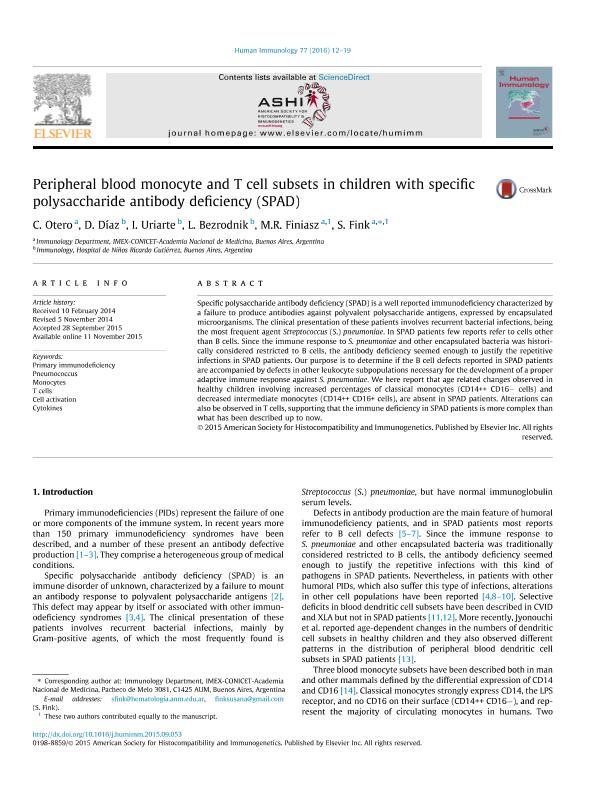Artículo
Peripheral blood monocyte and T cell subsets in children with specific polysaccharide antibody deficiency (SPAD)
Otero, C.; Díaz, D.; Uriarte, I.; Bezrodnik, Liliana ; Finiasz, Marta Regina
; Finiasz, Marta Regina ; Goldstein, Susana Beatriz
; Goldstein, Susana Beatriz
 ; Finiasz, Marta Regina
; Finiasz, Marta Regina ; Goldstein, Susana Beatriz
; Goldstein, Susana Beatriz
Fecha de publicación:
01/2016
Editorial:
Elsevier Science Inc
Revista:
Human Immunology
ISSN:
0198-8859
Idioma:
Inglés
Tipo de recurso:
Artículo publicado
Clasificación temática:
Resumen
Specific polysaccharide antibody deficiency (SPAD) is a well reported immunodeficiency characterized by a failure to produce antibodies against polyvalent polysaccharide antigens, expressed by encapsulated microorganisms. The clinical presentation of these patients involves recurrent bacterial infections, being the most frequent agent Streptococcus (S.) pneumoniae. In SPAD patients few reports refer to cells other than B cells. Since the immune response to S. pneumoniae and other encapsulated bacteria was historically considered restricted to B cells, the antibody deficiency seemed enough to justify the repetitive infections in SPAD patients. Our purpose is to determine if the B cell defects reported in SPAD patients are accompanied by defects in other leukocyte subpopulations necessary for the development of a proper adaptive immune response against S. pneumoniae. We here report that age related changes observed in healthy children involving increased percentages of classical monocytes (CD14++ CD16 cells) and decreased intermediate monocytes (CD14++ CD16+ cells), are absent in SPAD patients. Alterations can also be observed in T cells, supporting that the immune deficiency in SPAD patients is more complex than what has been described up to now.
Archivos asociados
Licencia
Identificadores
Colecciones
Articulos(IMEX)
Articulos de INST.DE MEDICINA EXPERIMENTAL
Articulos de INST.DE MEDICINA EXPERIMENTAL
Articulos(SEDE CENTRAL)
Articulos de SEDE CENTRAL
Articulos de SEDE CENTRAL
Citación
Otero, C.; Díaz, D.; Uriarte, I.; Bezrodnik, Liliana; Finiasz, Marta Regina; et al.; Peripheral blood monocyte and T cell subsets in children with specific polysaccharide antibody deficiency (SPAD); Elsevier Science Inc; Human Immunology; 77; 1; 1-2016; 12-19
Compartir
Altmétricas



